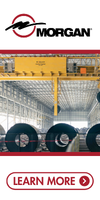Ryerson Tull Reports 2nd Quarter Earnings
07/29/2005 - Ryerson Tull, Inc. reported net income of $26.6 million on sales of $1.5 billion for the second quarter ended June 30, 2005.
Ryerson Tull, Inc. reported net income of $26.6 million on sales of $1.5 billion for the second quarter ended June 30, 2005.
The $26.6 million net income ($1.03 per diluted share) compares with net income of $21.2 million ($0.83 per diluted share) for the second quarter of 2004. Results included the contribution from Integris Metals, Inc. (acquired January 4, 2005); a pretax restructuring charge of $591,000 ($0.01 per share); and a special tax provision, which reduced earnings by $1.6 million ($0.06 per share). The second quarter of 2004 included a pretax restructuring charge of $593,000 ($0.01 per share); a pretax gain of $2.3 million ($0.06 per share) on the sale of property; and a $1.2 million after-tax ($0.05 per share) gain from discontinued operations.
"While metals prices softened as expected, particularly for carbon flat rolled, our volume remained strong," said Neil S. Novich, Chairman, President, and CEO of Ryerson Tull. "Our product diversification — with approximately half of sales from stainless and aluminum — has been beneficial. We feel very good about the way Ryerson Tull and Integris are coming together. And during the quarter, we brought down inventory and debt levels."
Sales of $1.5 billion increased 91.3% from the second quarter of 2004, primarily due to the acquisition of Integris, and declined 1.3%, sequentially, from the first quarter of 2005, due to a lower average selling price. Tons shipped increased 31.4% and 1.3%, respectively, from the second quarter of 2004 and the first quarter of 2005. The average selling price per ton expanded 45.6%, year-over-year, and declined 2.6%, sequentially.
Gross profit per ton was $284, compared with $216 in the second quarter of 2004 and $301 in the first quarter of 2005. Gross margins of 16.8% compared with 17.5% in the first quarter of 2005 and 18.7% in the year-ago period. Operating expenses per ton were $210, compared with $217 in the prior period and $162 in the year-ago period.
Interest expense increased to $20.6 million in the second quarter of 2005, from $19.4 million in the first quarter of 2005, and $5.1 million in the year-ago period. The year-over-year increase reflects higher debt levels to fund
the acquisition of Integris Metals and higher working capital requirements. "As expected, the acquisition of Integris remained accretive to earnings in the second quarter," said Novich.
Comparing the second quarter of 2005 with pro forma second quarter 2004 data, which assumes that the acquisitions of J&F Steel and Integris Metals had occurred on January 1, 2004, net sales increased 13.6%, year-over-year, on a 3.1% decline in tonnage. Gross profit increased 4.1%. Operating profit declined 6.6%, due to a second quarter 2004 gain of $4.8 million on the sale of assets ($2.3 million from Ryerson Tull and $2.5 million from a sale J&F completed prior to its acquisition in July 2004). Excluding this gain, operating profit increased 0.2%, year-over-year. "Despite declining carbon flat rolled prices and the comparison with an exceptionally strong second quarter of 2004 for that product, we continued to post strong results," stated Novich.
Integris Update—"Our priority with the integration of Integris is customer retention, and we have done an excellent job," continued Novich. "In terms of synergies, we have already taken some initial steps, which resulted in second-quarter cost savings of about $2 million." In June 2005, the Board of Directors approved a preliminary plan to consolidate facilities and integrate administrative functions. "We began implementing the facility consolidation plan in the third quarter of 2005 and remain confident in our ability to generate annualized cost savings of at least $30 million, going forward." The company expects to finalize its consolidation plan and determine related implementation costs by the time it releases its third-quarter results.
Financial Condition—In the second quarter of 2005, Ryerson Tull generated cash flow from operations of $85 million, enabling it to reduce debt and increase its credit facility availability by $75 million. Net working capital, excluding changes in cash and short-term debt, declined $37 million, driven by a $47 million reduction in inventory ($67 million in terms of current value) during the second quarter. The company ended the second quarter of 2005 with a debt-to-capital ratio of 71.7% and availability of approximately $242 million under its credit facility. "We expect to continue to improve working capital management and utilize cash flow to pay down debt," added Novich.
Outlook—"The third quarter is seasonally slower than the first half of the year, due to our customers' summer shutdowns," concluded Novich. "And we anticipate continued pressure on metals pricing. However, we believe our intense focus on operating costs, which has given us an efficient platform; our aggressive marketing, which is generating internal growth; and recent acquisitions, which have significantly and structurally improved our competitive position, will drive our performance over the long term."
Ryerson Tull, Inc. is a leading North American distributor and processor of metals, with first half 2005 revenues of $3.1 billion. The company services customers through a network of service centers across the United States and in Canada, Mexico, and India.



.jpg?lang=en-US&ext=.jpg)

